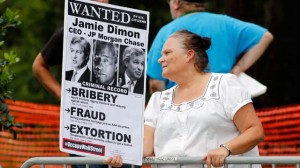
A protestor stands outside the gate of JPMorgan Chase after the annual stockholders meeting held Tuesday, May 15, 2012, in Tampa, Fla. (AP Photo/Scott Iskowitz)
JPMorgan, the nation’s largest bank, is now the focus of three separate investigations launched by the Federal Reserve, the SEC, and the U.S. Justice Department and the FBI; and a class-action lawsuit brought yesterday by a group of stockholders. The main question and focus of the inquiries and lawsuit is whether JPMorgan was hedging its risks (which is legal) or making a very large bet (which is not if you mislead investors) resulting in a $3 billion loss — not the $2 million originally reported.
Richard Escrow observed in The Huffington Post Wednesday that the “Chase disaster gives us a much-needed glimpse into our corrupt political system, its Wall Street paymasters, and the media voices that allow people like Dimon to escape scrutiny.”
ProPublica’s Jess Eisinger has little faith in the current investigations, writing in the NY Times Dealbook blog, “if you think anything is going to come of that, well, I’m pretty sure that JPMorgan has some derivatives it would love to sell you.”
“Perhaps JPMorgan was a model of probity, but so far these questions have been given only glancing treatment. The news coverage has largely focused on how the bank took the losses, what went wrong with its risk management and what it’s doing now. The commentary has mostly gone straight to discussing the implications for banking reform.
That’s already a victory for bankers — including Mr. Dimon. The first question on everyone’s mind should be whether any existing laws were broken.”
Former IMF chief economist Simon Johnson told Bill Moyers that he also thinks a separate investigation is necessary, saying “We need to have an independent, detailed, specific investigation to establish who knew what when and what kind of wrongdoing management was engaged in. On the basis of that, we’ll see what we’ll see and who should have to resign.”
Johnson went on to say that he believes the JPMorgan debacle “is the canary in the coal mine” that tells us that “something is fundamentally wrong with the way banks measure, manage and control their risks.” (Listen to the entire interview.)
“The goal should be to make all the banks small enough and simple enough to fail. End the government subsidies here. And when I talk to people on the intellectual right, Bill, they get this, as do people on the intellectual left. The problem is, the political right largely doesn’t want to go there because of the donations. And I’m afraid some people, not all, but some people on the political left don’t want to go there either.”
Meanwhile, Wall Street lobbyists are working overtime to minimize losses in D.C. as legislators are finalizing the new regulations set forth in Dodd-Frank. The New York Times reports that “Wall Street’s representatives, fearing that the entire banking industry might pay for JPMorgan’s sins, are trying to contain the fallout in Washington, people close to the matter said.”
When JPMorgan announced on Thursday that it had a trading loss of $2 billion that was expected to grow, some lawmakers and consumer advocates cast it as a case study on the need for stricter Wall Street oversight. The central policy, known as the Volcker Rule, would ban banks from trading with their own money, an effort to prevent bank blowups that necessitate bailouts with taxpayer money.
Yet calls for a crackdown, which come as regulators are putting the finishing touches on the Volcker Rule and other such overhauls, may not find many sympathetic ears in Washington.
Treasury Secretary Timothy Geithner said the loss makes a “very powerful case” for Dodd-Frank and in a speech on Tuesday, said that regulators would be focused on tightening regulations, including a “broader set of safeguards and reforms” in addition to the Volcker Rule, which is still being drafted. He also mentioned that he hadn’t spoken with Dimon since what he referred to as “the incident.”
It may be some time before we know whether JPMorgan has lost some of its influence in Washington in addition to the $3 billion dollars. There’s no question which is more valuable.

